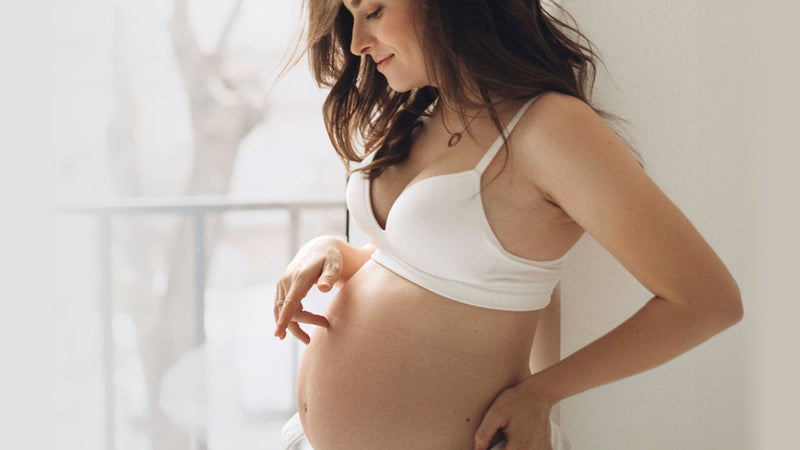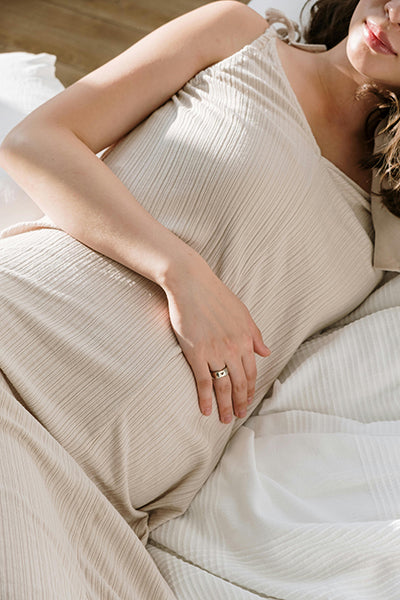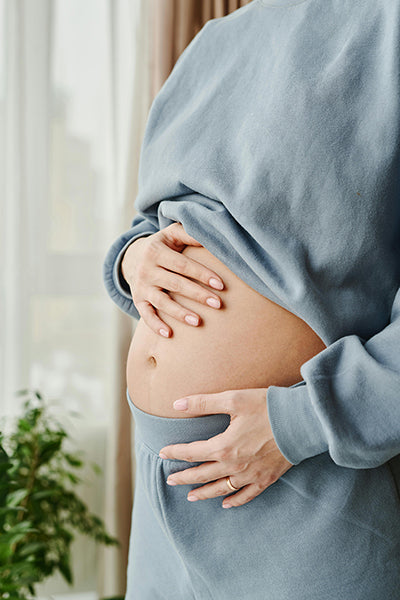KS NEWSLETTER
Schrijf je in voor onze nieuwsbrief en ontvang ✨5% korting✨ op je eerste bestelling!

Skincare
SkinTalks - August 01, 2024
Hey there, Skintalks readers! Or must I say hey there, mommies-to-be!
Pregnancy is a time of incredible change, not just for your growing baby but also for your skin. We're here to give you reliable info and handy tips on pregnancy skincare to keep your skin healthy and glowing during pregnancy. From understanding which ingredients to avoid to discovering the best skincare for pregnancy, we dive into all sorts of pregnancy-safe skincare topics just for moms-to-be.
Join us as we explore skincare routines, share expert tips, and offer solutions for common skin concerns during pregnancy. Let us help you feel confident and radiant as you embrace this beautiful journey.

Hormone changes cause many changes to your skin. You might get more acne, melasma, or hyperpigmentation, and you might also notice stretch marks.
Here are a few skin problems that can occur during pregnancy, along with some tips on managing them.
The radiant pregnancy glow is thanks to increased blood flow and oil production. However, this boost in oil can sometimes lead to unwanted acne.
Pregnancy acne is a natural condition. It usually goes away when your hormone levels return to normal. The safest thing to do is to avoid any prescription acne medications or over-the-counter chemical spot treatments. Instead, you can rely on drug-free home remedies.
During pregnancy, a natural rise in melanin causes darkened patches of skin, notably on the face. To reduce this "mask of pregnancy," known as chloasma.
Most of these discolorations will be reduced within a few months after giving birth.
While many women anticipate stretch marks on their belly during pregnancy, they may be surprised to find these pink or red streaks on their breasts, buttocks, and thighs as well.
Stretch marks can appear anywhere the skin rapidly stretches and grows. Despite numerous lotions and creams advertised, there are no proven methods to prevent or completely erase stretch marks.
Over time, stretch marks typically fade, and moisturizers can help reduce any associated irritation.
Products that appear harmless at first glance can often turn out to be quite the opposite.
We recommend avoiding Retinol, Retinyl linoleate, and Retinyl palmitate during pregnancy. Good substitutes for these ingredients are Vitamin C, Glycolic Acid, and Rosehip Oil.
Vitamin A is important for fetal development, but taking isotretinoin, a strong Vitamin A derivative, can cause birth defects.
Retinol is poorly absorbed through the skin and, in small amounts, is unlikely to harm a developing fetus. However, there is limited research on the use of topical retinol during pregnancy.
Despite the low risk suggested by studies, experts still recommend that pregnant women avoid using vitamin A-based skincare products during early pregnancy.
If you have used cosmetics with retinol or similar vitamin A derivatives during pregnancy, don't panic. Stop using the product and consult your healthcare provider for advice.

We recommend avoiding high concentrations of Hydroxy Acids (AHA, BHA) during pregnancy. Specifically, avoid Betaine salicylate and Salicylic acid.
Topical use of BHA results in minimal skin absorption. However, since oral salicylic acid is unsafe during pregnancy, doctors advise against frequent or excessive use of skincare products with BHA.
Small amounts of BHA and AHA, like a toner with less than 2% salicylic acid or less than 10% glycolic acid used once or twice daily, are generally considered safe. The main concern is with high-percentage facial and body peels containing these acids. Always consult your healthcare provider before undergoing any peels.

AHA and BHA products make your skin more sensitive to sunlight, so protect your skin from the sun when using these products.
Willow Bark, a natural equivalent of salicylic acid, has similar effects but is gentler. However, due to the lack of evidence on its safety during pregnancy, it is also excluded from our 'pregnancy-safe' list.
If you have used products with high percentages of AHA or BHA during pregnancy, don't panic. Stop using them and consult your doctor for further guidance.
This ingredient is often used to lighten pigmentation. The research on the use of Hydroquinone during pregnancy is very limited, but because the ingredient is absorbed through the skin very quickly, many experts recommend avoiding it during pregnancy.
A good alternative for Alpha-Arbutin would be Vitamin C.
We exclude Homosalate, Octisalate, Octinoxate, and Octocrylene. Good substitutes for these ingredients are mineral filters like Titanium Dioxide and Zinc Oxide.
Studies show that active sunscreens don't pose a risk during pregnancy. Daily use of sunscreen is highly recommended by skin experts, especially during pregnancy. However, your skin may become more sensitive during this time. If this happens, consider using sunscreens with only mineral filters, such as Titanium Dioxide and Zinc Oxide, as they usually cause less sensitivity.
In general, ingredients like Avobenzone, Benzophenone, Octocrylene, and Oxybenzone are often considered safe in low percentages, even during pregnancy. However, because these can sometimes trigger sensitivity, we exclude them from our selection.
Peptides are safe to use during pregnancy and are excellent for maintaining a youthful skincare routine.
Wishing you a healthy, glowing pregnancy journey filled with confidence and radiant skin. Embrace these changes and enjoy the beauty of this special time with our pregnancy-safe skincare tips. Stay radiant, mommies-to-be!

Interview | Mar 07, 2025
Discover Haruharu’s story from its CEO in this Women’s Day interview.
Routine | Jan 15, 2025
Let's talk about how to take proper care of your hair based on its porosity.
Schrijf je in voor onze nieuwsbrief en ontvang ✨5% korting✨ op je eerste bestelling!
Thanks for subscribing!
This email has been registered!